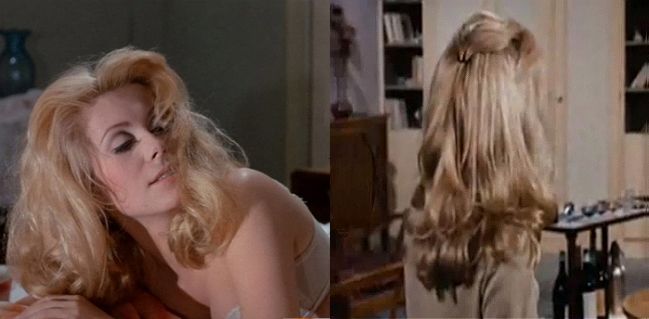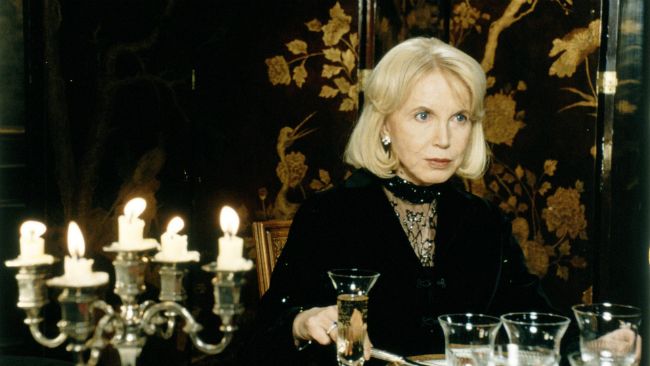
A wry and wary Catherine Deneuve on a French television program
where she discusses her position against marriage
Tiberge, from GalliaWatch, has written a post on the still-beautiful Catherine Deneuve (it is hard to imagine that Deneuve is now sixty-nine years old). The article is on her blog GalliaWatch, and I have posted it in my previous post. The post is on a television appearance by Deneuve where she talks about marriage (or more precisely, the elimination of marriage).
Tiberge in the email she sent me writes:
I did this post today on Catherine Deneuve...There might be something to say about beauty - it changes according to what the person says and represents. She is certainly beautiful, but her thinking is so twisted, that she suddenly appeared ugly to me. She is so terrified (or horrified) of "bourgeois" values she goes to any length to discredit them.Deneuve is staying true to her artistic choices. She appeared in a horrific film by surrealist filmmaker Luis Bunuel titled Belle de Jour, where she is a prostitute by day and a bourgeois housewife by night. Belle de Jour is also her "working" name, "Since you only come in the afternoons" says the woman who is about to hire her. The clever and cynical Bunuel is of course playing on the "housewife as whore" who is available at home to her husband at night to be a "whore for a housewife." Bunuel resumed his "bourgeois" theme with his 1972 film The Discreet Charm of the Bourgeoisie. It is a more banal film, but no less a devastation of French middle-class society. Bunuel's aim is to destroy its fabric.
Even the usually permissive and liberal J. Hoberman, The Village Voice's loose and liberal film critic, finds Belle de Jour shocking ("chic and shocking" are his words, where he hangs on to his avant-garde superiority while remaining a bourgeois at heart).
Unavailable for almost two decades because of rights problems, Belle de Jour emerged from its long absence in the mid-nineties looking as chic and shocking as when it first scandalized the bourgeois world. Catherine Deneuve, fresh from her triumph in Jacques Demy's films, plays Severine, a middle-class Parisian wife who seems to have the perfect husband: solicitous, successful, and kind. But the bored bourgeoise daydreams about degradation, and finds it in a brothel where she spends her afternoons as fetish and fantasy object to an assortment of strange clients (including the famous Japanese with the mysterious box). Séverine's fantasies of humiliation escalate until she (and we) can no longer tell illusion from reality. The coolly beautiful Deneuve, who has never seemed blonder, is an object of desire whose very remoteness, coupled with Bunuel's serene tone, only amplifies the film's perversity. (Chaste precision provides the kick in Bunuel's kinkiness.) "A perfect film" (J. Hoberman, The Village Voice).Bourgeois sentiments are easily "shocked," or they claim to be shocked, while supporting any kind of perversity at least in principle. "We would never do this, but other people can, if they want to."
I watched the film either at a film festival or on an "arts film" program on television, and was shocked, not at the content of the film (by then, I knew that surrealists, and many French directors, filled their scenes with similar images) but at Severine's callousness. "Coolly beautiful" is how Hoberman describes Severine, where she wreaks havoc on her unsuspecting husband's life while indulging in her desires. And there is no-one more suited to play Severine than the "coolly beautiful" Deneuve herself.

Scenes for Luis Bunuel's Belle de Jour: The two sides of Severine
Bunuel, before he started making "chic and shocking" films, stuck simply with the shocking. One of his first films is the horror-like "semi-documentary" film Las Hurdes (Land Without Bread), where he portrays a real village in Spain. According to John Hopewell, author of Spanish Cinema Post-Franco:
In many ways, [Land Without Bread] was a surreal documentary. Much of the imagery is dramatic and studied.I would add, "dramatic and studied in order to shock." Inhabitants of Las Hurdes complained that:
He prostituted and falsified history disgracefully... His whole film is one big lie... He was very cruel to blacken us in that way... I think it's a pointless film.The rich and "coolly beautiful" Deneuve (unlike the poor inhabitants of a remote village) can chose what films she will act in, and what roles to refuse. But, even she is not immune to the film fiction that will chain itself to her real life.
This most famous of French film stars shows that she is willing to attach her name and talent to positions that could essentially destroy life. Forty years after she played the marriage-destroying Severine Serizy, she publicly announces, without any of the ambiguity of art, that marriage is unnecessary, that homosexuality is good, that children don't need mothers and fathers. She is willing to prostitute herself for the pleasures of sex (what else is conjugal living without marriage, and what else is at the core of homosexual unions?), while destroying society.
As she says in her interview above:
Why marry when everyone is divorcing? It's bizarre.Deneuve married photographer David Baily in 1965 whom she divorced in 1971. This was to be her only marriage. She has two illegitimate children, by two different men. She's had a string of partners, some lasting a few months, others several years. One could say that she practices what she preaches.
The great Portuguese director Manuel de Oliveira re-made Belle de Jour in 2006, calling it Belle Toujours (Always Beautiful), which is a wry regard at the no-longer so beautiful, elderly Severine who is forty years older. The two protagonists of Belle de Jour, Deneuve and Michel Piccolet (who encouraged her into prostitution) return twenty years later, and engage in a series of conversations. The film is lovely, only as de Oliveira can make films. I wrote about the film here:
Dvorak's Symphony No. 8 in G major, Allegretto grazioso was playing throughout Maneol de Oliveira's 2006 Belle Toujours, with scenes of Paris floating by at night... De Oliveira is a Portuguese filmmaker, but like all artists, he quotes other artists. In this case, it is Bunuel's 1967 Belle de Jour. In fact, de Oliveira ingeniously resumes Belle de Jour by reintroducing the two lead characters several decades later.Oliveira's re-make is more of a morality tale. Perhaps life does resemble art, where the contemporary Deneuve succumbing to many years of sinful living (her affairs, her illegitmate children), can now only live through her sins, speaking out for any kind of atrocity that a more Godly woman would denounce.
The...man, now in his late seventies, is clearly enjoying life with his cigars and whisky. But, the woman (played in Bunuel's film by the beautiful Catherine Deneuve) has ended up bitter and wary. She was the one who became a prostitute to overcome her frigidity. She now talks about going to a convent, surely to repent of her past sins.
Ironically, she made Belle de Jour while she was in the middle of her (only) marriage. Perhaps the film corrupted her ways. The "madam" in the film sold Severine's body. Deneuve now sells the souls of others.

A much older Severine (impersonated by Bulle Ogier) has become a dour-faced, prudish middle-aged woman who thinks of retreating into a convent in de Oliveira's Belle Toujours. Is Deneuve, in the twilight of her days, trying to expiate herself of her sins by piously handing out maternal and paternal rights to those she deems unfortunate?
-------------------------------------------------------------------------------------------------------------------------------------------------------------
Posted By: Kidist P. Asrat
-------------------------------------------------------------------------------------------------------------------------------------------------------------
